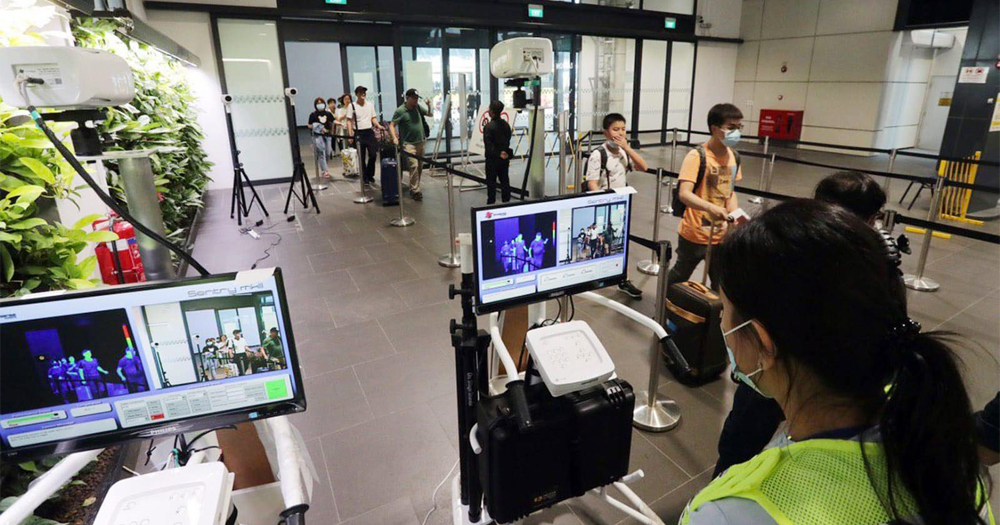Singapore will start to impose a new requirement for all arriving travellers to take a Covid-19 PCR test upon arrival, starting from 11:59pm on Jan. 24.
The new requirement is part of additional border control measures to "manage the risk of importation", in light of new virus variants and the worsening Covid-19 situation around the world, the Ministry of Health (MOH) said on Jan. 16.
Other new measures being introduced are a longer isolation period for those arriving from the UK and South Africa, as well as a new requirement for short-term visitors to purchase Covid-19 insurance.
Testing all travellers upon arrival
The PCR test is on top of current requirements for Covid-19 testing, which are as follows:
- Travellers who are not Singapore Citizens (SCs) or Permanent Residents (PRs), and who have recent travel history to high-risk countries/ regions, must take a Covid-19 PCR test within 72 hours before departure.
- All travellers subject to Stay-Home Notice (SHN) must undergo a Covid-19 PCR test at the end of their SHN.
Longer time in isolation for those arriving from UK and South Africa
MOH will be requiring those arriving from the UK and South Africa to spend an additional seven-day self-isolation at their place of residence, with effect from 11:59pm on Jan. 18.
This is on top of the existing requirement of a 14-day SHN, which must be served at dedicated facilities.
They will be tested at the end of the 14-day SHN, and again at the end of the seven-day self-isolation.
The further precautions will apply to travellers from the UK and South Africa who are currently serving their SHN, MOH said.
Only returning Singapore citizens and Permanent Residents are allowed to enter Singapore from the UK and South Africa, as MOH previously restricted entry and transit for all long-term pass holders and short-term visitors with recent travel history to the two countries.
This was due to concerns of a more contagious variant of Covid-19 circulating there.
New requirement for short-term visitors to purchase Covid-19 insurance
Currently, short-term visitors entering Singapore under the Air Travel Pass (ATP) and Reciprocal Green Lanes (RGLs) are required to bear the full costs of medical treatment, should they be suspected of being infected with Covid-19 or require medical treatment for Covid-19 while in Singapore.
With effect from 11:59pm on Jan. 31, visitors applying to enter Singapore under the ATP and RGLs will need to have travel insurance for their Covid-19-related medical treatment and hospitalisation costs in Singapore.
They must purchase insurance with a minimum coverage of S$30,000.
The travel insurance is to help them pay for the costs of their medical treatment in Singapore, MOH said, adding that visitors can purchase the travel insurance from Singapore-based or overseas insurers.
A list of available insurance products can be found at the SafeTravel website, MOH said.
Measures will be updated in line with data and evidence
MOH said that it would continue to review the data and evidence on any new viral strains and update its measures accordingly.
It advised travellers to visit the SafeTravel website to check for the most updated border measures before entering Singapore and be prepared to be subjected to the prevailing border measures upon entry, including payment for their stay at dedicated SHN facilities, tests and treatment.
New testing requirement for Construction, Marine and Process sectors
Separately, the Ministry of Manpower (MOM) has also announced a new requirement for Covid-19 testing, in a Jan. 16 statement.
Newly-arrived work permit and S pass holders from the Construction, Marine and Process (CMP) sectors from higher-risk countries or regions must take two Covid-19 tests on arrival in Singapore from Jan. 18.
The tests are an On-Arrival Polymerase Chain Reaction (PCR) test and an On-Arrival Serology Test.
According to MOM, the Multi-Ministry Taskforce (MTF) is setting this new requirement in response to "the worsening of Covid-19 situation around the world, the emergence of new virus variants, and recent community cases seeded by imported cases."
The On-Arrival PCR test will enable early detection of Covid-19 cases, provide access to medical care quickly, and reduce the risk of leakage of imported cases into the community, MOM said.
The On-Arrival Serology Test on the other hand, will allow for the identification of workers who have recovered from Covid-19 and have antibodies.
Recovered workers will be exempted from the Stay-Home Notice (SHN), the additional seven-day testing regime, and Rostered Routine Testing (RRT) requirements.
This can help to minimise work disruption and associated costs from the SHN and tests, MOM said, adding that the cost of the new On-Arrival Tests will be borne by the employers.
Top photo via Lawrence Wong/Facebook.
If you like what you read, follow us on Facebook, Instagram, Twitter and Telegram to get the latest updates.
